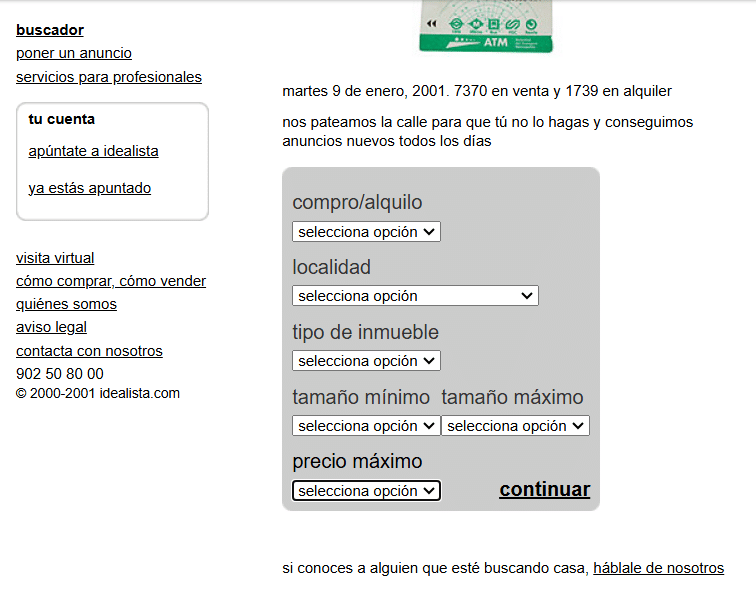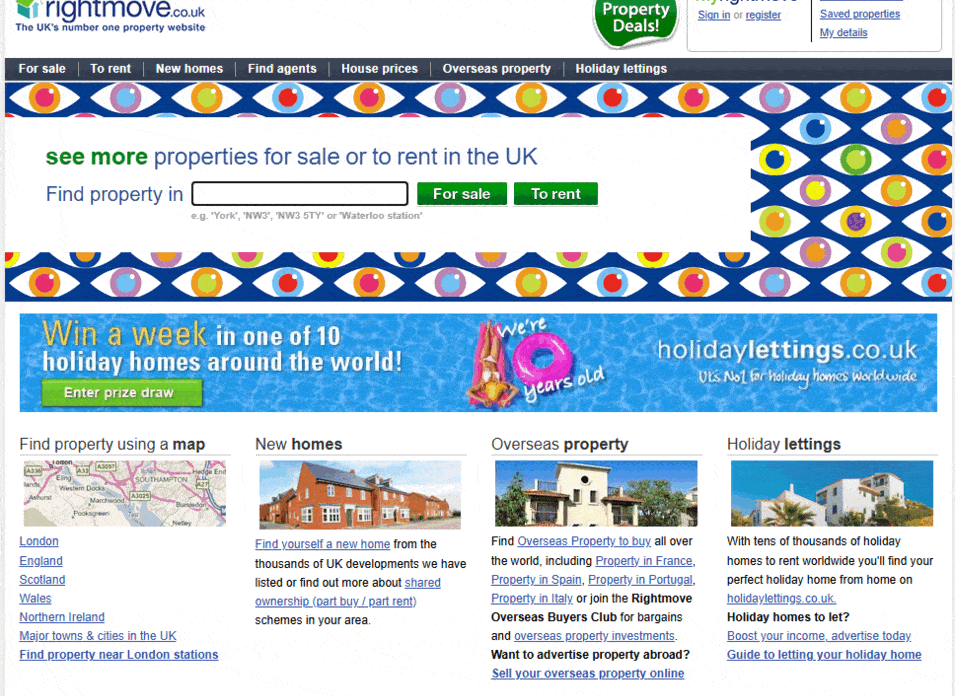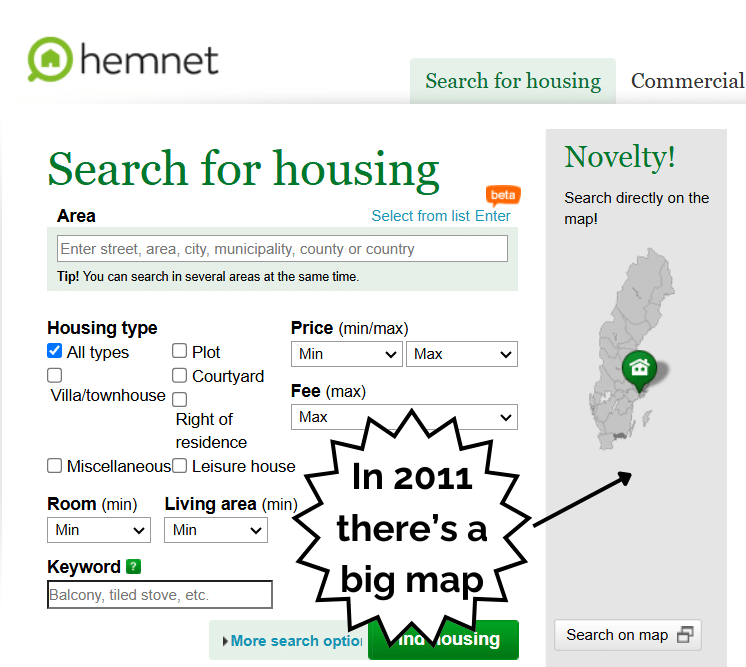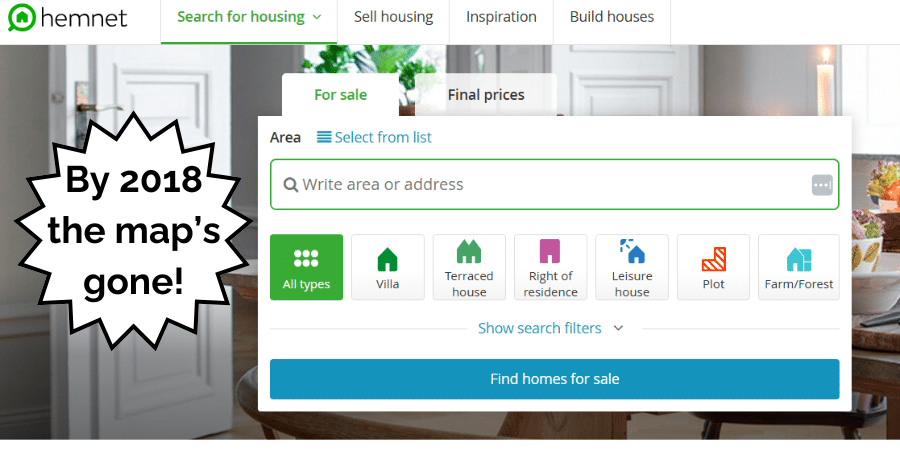
Remember plain blue text links? Real estate portal homepages used to be full of them. They led to useful things like removal services, guides on how to sell your home or even 'about us' sections that weren't written in that now ubiquitous self-congratulatory corporate tone.
Looking at the evolution of real estate portal homepages over time via the Wayback Machine the most striking change is the gradual loss of these links.
Product Managers would say their loss was all in the name of "clean", "sleek", and "de-cluttered" user interfaces and, of course, they'd be right. But is the homogenisation of real estate portal homepages symptomatic of something rotten at the heart of the industry?
Below: Before the homogenisation of web design homepages sometimes revealed a bit about how founders thought about their businesses. Here Idealista's homepage from 2001 has a quaint message that reads "We traipse around the streets so that you don't have to and we get new ads every day".

Rightmove has over two hundred software engineers. It would appear that none of those employees have been working on the portal's homepage lately. The only noticeable change to it in recent years has been the tagline which has gone from "Find your happy" to the curiously lower-case "believe in finding it".

Above: Rightmove's homepage from 2009 to 2025
Rightmove is only one example though. Wherever you might be looking for property in 2025 the homepage of your local real estate marketplace serves as a vortex, sucking you in towards the monetisable listing pages. Anything that in the past might have drawn your eyes away from the search bar towards a button or link without the dollar sign lurking behind it has been relegated or removed.
It's not just user forums, area guides, and the less lucrative adjacent services that have gotten the chop from portal homepages. Some search features that do actually lead users to results and listing pages have also been sacrificed over time.
Many portal users would no doubt prefer to start their search on a map. Others would find it really useful to get a quick valuation of their current house before they start searching to get an idea of what they can afford. So why would a real estate portal want to hide these features away?


Above: One victim was Hemnet's map search which was lost in the 2010s
The answer is the emergence in the 2010s of A/B testing which allowed simultaneous trials of two different versions of a webpage to determine which performs better.
Before Google Optimizer launched in 2006, this kind of website testing didn't really exist. Over the next decade, web testing and optimisation tools rapidly improved, and by 2016...
"...the quality of the tools became way better, most issues were fixed, personalization came to the marketplace and this is the year that A/B testing went through puberty and fully developed. Ever since, A/B testing continues to rapidly evolve, and is now the essence of successful companies." The McMillan Phillps Marketing Blog.
Portal Product Managers tweaked and tested like never before guided by the people above them who were in charge of the money.
The result is today's identikit websites where user flow is carefully calculated and adjusted for maximum monetisation based on rigorous A/B testing. Seen through this lens the changes on portal homepages are not homogenisation but optimisation.
The user who wanted to start their search with a map will make do with a traditional results page where listings are ordered by who paid more. They only use the portal once every decade when they need to move home, so that extra click to switch to the map tab won't annoy them nearly enough to send them to a different portal. Even if it did, any rival website would most likely hide its map as well.
When they appeared, map search and automated valuations were probably considered industry-shifting innovations. Both changed what property portals did and how users thought about the process of elimination leading to their next home.
Maps allowed the user to see the location of each listing at a glance, while AVMs gave them a much better understanding of which listings they could afford. Both tools helped the user rule out irrelevant listings faster and made property search more efficient.
Artificial intelligence-based search has been touted as the next industry shifter. The idea is that a user can input a far more detailed and granular search which is much more efficient at finding the right new home for them. The future, we're told, is about using natural language or voice search to match rather than trawl.
The problem is that most portals are set up to make money from users trawling through listings, viewing as many as possible and sending as many leads as possible before eventually settling on a new home. Anything that helps users quickly rule out listings is bad for business.
The chart above shows that real estate portal companies have generally been keen to tell the world about AI product updates they've shipped.
However, there's a disparity between the announcements and industry hype and what consumers are still seeing on the front end of major portal websites. Of all the big-name real estate portals around the world, only ImmoScout24 in Germany has actually put an AI-based search on its homepage.
The bosses must be watching that particular A/B test very keenly.
My pessimistic guess is that if I return to the Wayback Machine in five years, ImmoScout's AI search will have gone the way of maps, draw-your-own search area and search by travel time—relegated to an interstitial page or the "more search options" tab. I hope I'm wrong.